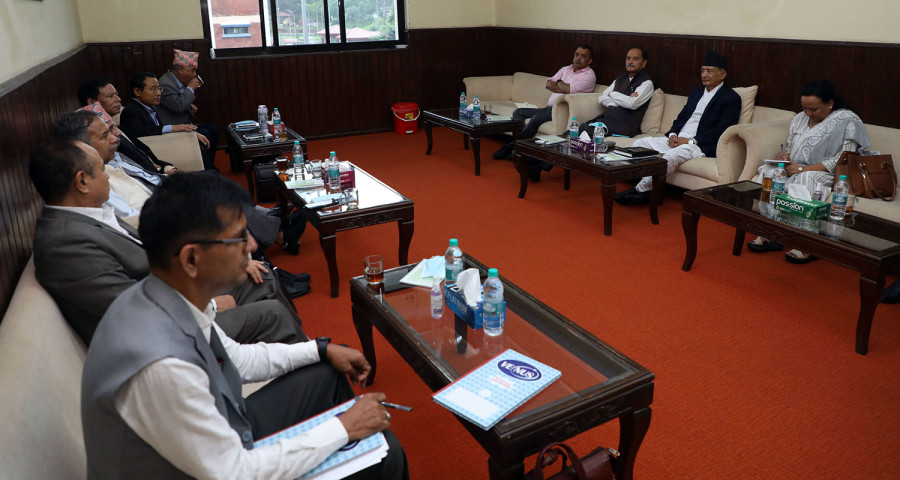Politics
Coalition task force fails to decide seat-sharing model
The five-party ruling coalition has tasked 11 members with finding a seat-sharing arrangement by August 16.
Tika R Pradhan
The second meeting of the task force formed to work out seat-sharing among the five ruling parties for the November 20 federal and provincial polls failed to finalise even the allocation modality on Thursday.
“We discussed different modalities to be adopted for seat-sharing for the upcoming polls but could not come to a conclusion today,” said Himalal Puri, a member of the task force representing the Rastriya Janamorcha.
During the meeting, the task force discussed various modalities including—whether to consider the results of the 2017 polls or the May 13 local polls as the basis—but the task force members could not fix a modality as they were divided.
After agreeing to contest the upcoming federal and provincial polls under an alliance, the five parties in the ruling coalition had formed a 11-member task force to finalise a seat-sharing arrangement among them within August 16.
The task force includes three leaders from the Congress—Krishna Sitaula, Gagan Thapa and Gyanendra Bahadur Karki—and two each from the other four parties—Dev Gurung and Barshaman Pun from the CPN (Maoist Centre), Pramesh Hamal and Beduram Bhusal from the CPN (Unified Socialist), Rakam Chemjong and Ram Sahay Yadav from the Janata Samajbadi Party, and Himalal Puri and Ananda Sharma from the Rastriya Janamorcha.
Karki, however, said the task force will soon finalise seat-sharing. But he didn’t elaborate how that could be done without a modality in place.
All major parties in the coalition have their own strategies to limit each other in view of the post-election scenario where no party is likely to win a clear majority.
Nepali Congress, the largest constituent in the alliance, is eying a majority, for which its leaders are aiming for a 60:40 ratio for the Congress and other parties in the alliance. This means the party needs to keep for itself around 99 of the 165 first-past-the-post seats. But the CPN (Maoist Centre) aims to become the kingmaker even in the next parliament so that the Congress can’t form the government on its own or with support from other smaller parties.
According to Maoist leaders, the party will press for seat division in a 50:50 ratio, which will limit the Congress to 82-83 candidates and as many for the four other parties.
The members of the task force said they have discussed the modality but will finalise it only after discussing within their respective parties and then work out one in the next meeting scheduled for August 15.
“Basically we have agreed to set a modality based on the 2017 polls though there are complications as there was an electoral alliance and Unified Socialist was not formed,” said Prakash Jwala, a leader of CPN (Unified Socialist) who was present in today’s meeting. “Since there are issues in setting a concrete modality we have discussed taking a political decision considering all these issues.”
Jwala said the task force discussed the FPTP and proportional representation seats of the previous 2017 polls and management of the party leaders besides the necessity of the electoral alliance.
The coalition partners will hold bilateral and multilateral discussions on the sharing of seats before the task force sits.
“It’s difficult to develop a single modality given the complexities but once we develop one, seat sharing will be smooth,” said Ananda Sharma, another task force member representing Rastriya Janamorcha. “We will try to finalise the seat sharing in whatever places we can at the next meeting scheduled to be held after four days.”
According to leaders present in the meeting on Thursday, Maoist Centre and Unified Socialist had said the 2017 poll results should be taken as the basis for the seat sharing but the Congress leaders say that cannot be a workable basis as the Maoist Centre had allied with the UML—the party that the Unified Socialist split from last year. Congress is in favour of taking the local polls results as a basis besides the seats acquired through proportional representation system.
Unified Socialist leaders presented their claim at the task force’s meeting that they have 22-25 percent vote share of the UML.
There are also complexities with both the Loktantrik Samajbadi Party and Baburam Bhattarai’s newly registered Nepal Samajbadi Party—formed after splitting from the Janata Samajbadi Party—also interested to join the ruling coalition. Prime Minister Sher Bahadur Deuba has assured them of a decision after consulting with the other coalition partners.
"I think parties could come to an agreement to follow all the modalities we discussed and make political decisions based on all those modalities," Jwala told the Post.
Though the task force members have claimed that they are having positive discussions and they could finalise some of the seat sharing arrangements in the next meeting, it is difficult for the parties to manage the seats unless all the parties agree to compromise.
Political analyst Sanjeev Humagain said since there are complexities in managing seat-sharing, the task would take time with the committee requiring frequent consultations with their leaderships.
“Since the existing coalition is not based on any principle, programme or expected outcome one cannot predict about this coalition,” said Humagain, who teaches political theory at Tribhuvan University. “I think this task force will ultimately ask the top leaders of the alliance to decide seat-sharing.”




 8.79°C Kathmandu
8.79°C Kathmandu














